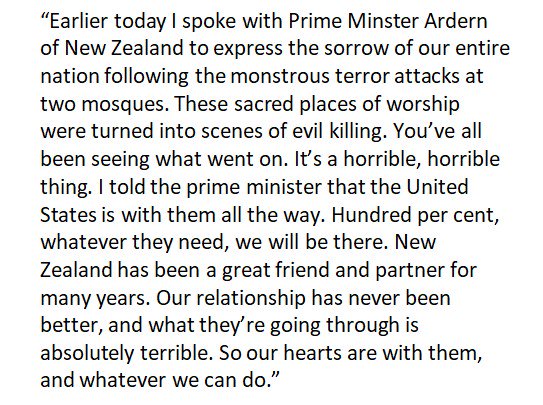He
completely failed
By Cody Fenwick
March 15, 2019
New
Zealand Prime Minister Jacinda Ardern spoke with President Donald Trump on
Friday in the wake of the horrific attack at two mosques in Christchurch that
is believed to have killed 49 people.
In
recounting her conversation with Trump, she said: “He very much wished for his
condolences to be passed on to New Zealand.”
She
continued: “He asked what support the U.S. could provide. My message was
sympathy and love for all Muslim communities.”
When asked what his response
was, she said, “He acknowledged that and agreed.”
But
despite agreeing to the request on the phone, Trump didn’t follow through. When
Trump held a public event on Friday in the Oval Office and addressed the
devastating attack, he was seemingly unable to share the “love” and “sympathy”
for all Muslim communities that Ardern had requested.
In
his statement about the attack, he expressed sorrow for New Zealand without
mentioning Muslims directly at all.
His
earlier comments had also omitted any mention of Islam, Muslims, Islamophobia,
or the white nationalist bigotry that inspired the attack. On Twitter, he
continued to direct his concern specifically to New Zealand — even saying “We love you
New Zealand!” — without honoring Ardern’s simple request of reaching out to
Muslims in particular.
It may seem like a quibble, but Ardern’s request was quite direct, and Trump actually seems to be bending over backward to avoid expressing sympathy for Muslims.
There’s a pernicious logic behind this choice: For Trump, Muslims are
the aggressors, not victims. He spent his entire presidential campaign and much
of his presidency. spreading disinformation and bigotry about Muslims, and to
acknowledge that they too can be victims — and victims of a white supremacist
ideology that he embraces — would undermine the rationale for his rise to the
presidency.
He’s even made policy based on this hateful campaign against
Muslims.
But
this rhetorical choice is dangerous. It sends a clear signal of approval to
bigots like the perpetrators of the heinous terrorist act in Christchurch. And
for the less extremist among Trump’s supporters, it gives them license to
disregard to dangers of Islamophobia.
And
when Trump continued in the press event to celebrate his national emergency
declaration that continues to stoke unnecessary fears about the border — fears
which he has repeatedly tried to tie, erroneously, to threats from Muslim terrorists — he continued to fan
the flames of white supremacy and anti-immigrant hostility.
He even invoked the
hateful language of an “invasion” at the border during the event — the
exact word the suspect in the Christchurch attacked is believed to have used to
describe his fear of Muslim immigrants.
